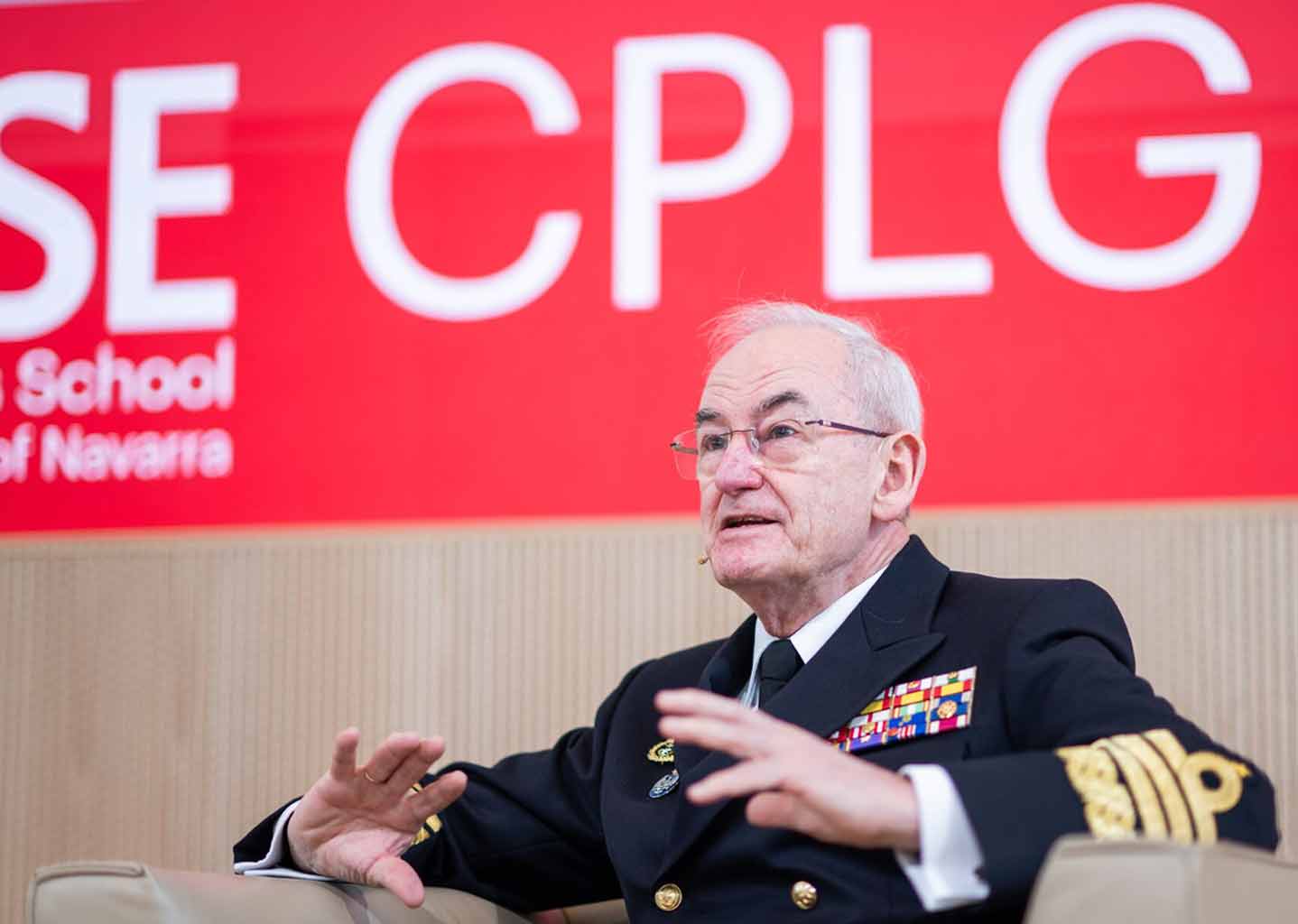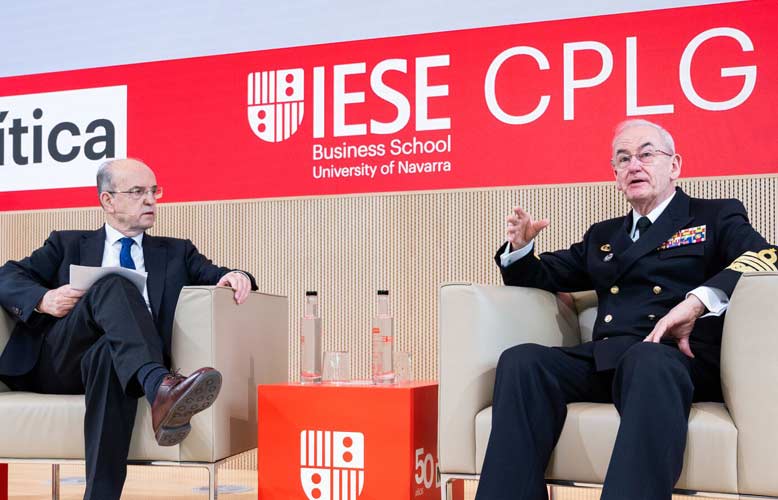
IESE Insight
Prepare for a new age of conflict, warns Spain’s defense chief
As the rules-based world order crumbles, resilience and deterrence are the new rules of the game.
The Russia-Ukraine war is not just a military crisis; it’s a crisis for the rules-based order that characterized international relations since the end of World War II. And just like governments are preparing for a world where conflict and disruption are no longer rare occurrences, businesses, too, must strengthen key capabilities, like resilience, in anticipation of systemic risks.
Here, the Chief of the Defense Staff of the Spanish Armed Forces, Admiral General Teodoro E. Lopez Calderon, discusses the challenges ahead with IESE Prof. Santiago Alvarez de Mon.

Santiago Alvarez de Mon: How has the Russia-Ukraine war changed the rules of game?
Teodoro E. Lopez Calderon: This conflict marks a turning point in international relations. Beyond the human suffering, what’s at stake is the rules-based international order built after World War II. Trust in the keeping of international treaties has been broken, starting with the United Nations Charter, which affirmed a commitment not to use force or threaten its use to achieve political ends. Additionally, confidence-building and arms-control measures like the Vienna Document have lost their value.
For decades, we lived with few real threats, which led to a certain complacency. If there’s no obvious problem, there’s no perceived need to prepare. But that mindset no longer applies. With the deterioration of the international order, defense can’t be taken for granted. You must be prepared and not leave yourself exposed, as adversaries will take advantage of any signs of weakness.
It’s crucial to understand that national defense is not just the responsibility of the armed forces; it concerns society as a whole. In a real conflict, like the one in Ukraine, businesses, infrastructure and the daily lives of citizens are all impacted.
SAM: What are the implications of Donald Trump’s return to the U.S. presidency for European security and the future of NATO?
TELC: Trump’s return represents a new jolt. While it’s positive that he insists on a Russia-Ukraine peace agreement, he hasn’t succeeded yet. The conditions demanded by Russia remain unacceptable to Ukraine and Europe, and without real pressure on Moscow, the war will continue.
On the transatlantic front, the U.S. shift didn’t start with Trump. Since the Obama administration, responsibility for conventional deterrence against Russia has been transferred gradually to Europe. Washington has reoriented itself toward the Asia-Pacific, which it now sees as the new strategic and economic center of gravity. Europe, given its demographic and economic weight, must assume a greater share of the conventional defense burden on its own continent.
Trump has intensified this demand, particularly regarding member states allocating a higher percentage of their GDP to military spending. Europe will need to strengthen its military capabilities so that the U.S. can focus on its main strategic rival: China.
SAM: Why has deterrence become a central element of international security?
TELC: I always say that the success of armed forces lies in not having to use them. To achieve that, they must have a credible deterrent capability. Political will is also essential. But fundamentally, an adversary must believe that an attack won’t be worth the cost. Deterrence is expensive, yes, but armed conflict is far more costly. And if you lose, the impact is devastating.
Investing in deterrence is, in fact, a smart strategy to avoid confrontation. Today, we live in a geopolitical environment where the use of force is gaining ground as a way to achieve political objectives. This creates a dangerous domino effect. What happened in Kashmir in May 2025, when tensions escalated between India and Pakistan, shows just how normalized the use of force has become.
SAM: What scenarios might emerge once the Russia-Ukraine conflict is settled?
TELC: It depends on how that conflict ends. If the outcome is ambiguous or favorable to Russia, it will weaken the principle of international legality. The risk is a return to accepting force as a legitimate means of altering borders or imposing one’s will.
“Countries will be forced to take sides”
The international landscape could go in different directions: a bipolar world, with clearly defined spheres of influence split between the U.S. and China; or a tripolar world, if Russia manages to consolidate its position as a third power alongside the U.S. and China.
Either way, countries will be forced to take sides. Some, like India, might maintain a degree of autonomy. With a population already surpassing China’s and its growing economic and military might, India will be a key player in any future configuration of international powers.
SAM: What impact does the nuclear threat have on the global power balance?
TELC: One of the most troubling messages from recent conflicts is that if a nuclear-armed country commits a conventional act of aggression against another state, the international community will hesitate to intervene. We intervened militarily in Libya, Syria and Kosovo precisely because the nuclear threat wasn’t present. In Ukraine’s case, however, there has been no direct intervention, and the reason is obvious: Russia is a nuclear power. This has prompted many countries to reevaluate their defense strategies. Conventional deterrence alone is no longer enough; some level of nuclear protection is now seen as necessary.
Historically, Europe’s deterrence has relied on the U.S. security guarantee within NATO. But if the U.S. reduces its commitment, Europe will be left in a more vulnerable position. And that’s a scenario that deserves serious reflection.
SOURCE: Edited from a conversation between IESE Prof. Santiago Alvarez de Mon and Admiral General Teodoro E. Lopez Calderon, Chief of the Defense Staff of the Spanish Armed Forces, during the session “A World in Conflict” at the Geopolitics Summit held on IESE’s Madrid campus in May 2025.
READ ALSO:
Rethinking corporate strategy in the age of geoeconomics
Thyssenkrupp CEO sees future as green and marine, less steel
Nitin Nohria: “The 21st century will be a multipolar century” (from 2019)
This article is included in IESE Business School Insight online magazine No. 170 (Sept.-Dec. 2025).
